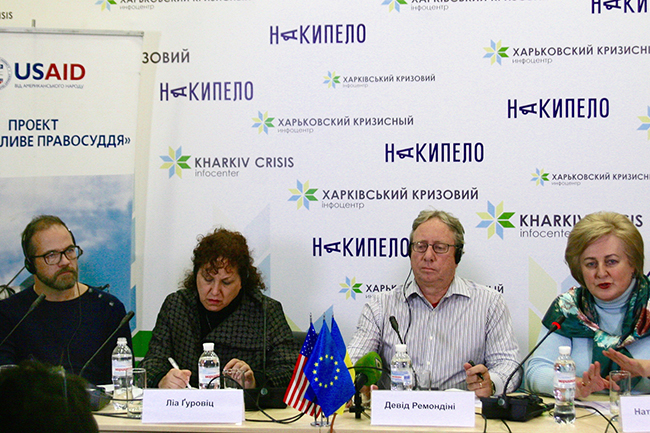Media training for judges in Kharkiv: how to strike a better balance between freedom of speech and the justice system’s
October 16, 2015
“A truly democratic country needs both the courts and the media” said Galina Yurovskaya, judge at Kiev High Court for Criminal and Civil Cases, summing up the discussion on the seminar “Relations between the public and judges” on Wednesday in Kharkiv.

Ukrainian courts have recently started appointing spokespersons at all levels of the court system. These “press judges” or “judge speakers” are meant to take charge of and repair the public relations of the courts by engaging with the media and providing access for the public into the “workshops of justice”. The USAID FAIR Justice project in collaboration with EUAM this week conduct seminars throughout Ukraine for judges and PIOs on how to deal with the media. At the seminar in Kharkiv where about 20 judges and 20 PIO staff this sunny Wednesday assembled in a hotel near Freedom Square to give the judge speakers a good start.
At the seminars judges and PIOs get a chance to try out some basic tools and methods of public relations. Working with language is one of such tools. Judges usually employ highly intellectual language with references to the law that is hard to understand for ordinary people. But a little awareness of how the media thinks actually allows the judges to phrase their messages in words that give meaning to everyday people.

While Ms Yurovskaya pinpointed a fundamental tension between freedom of speech and the court’s defence of fair and transparent justice that the Ukrainian judges face every day when trying to open up towards society, she also created a nice soundbite, readymade for media broadcast. Everybody can understand why, “a truly democratic country needs both the courts and the media”. In fact, most people would probably agree that the two are so inter-dependent that it would make really good sense to forge a better working relationship and better mutual understanding. A soundbite works like that. It does not need any more explanation.

The media trainers at the seminar happily pointed this out to the judges: “When you prepare to meet the media, think about a nice quote that summarizes your message and that will look nice as a headline. That’s a soundbite” said Soren Sonderstrup, communication expert and Acting Head of the PPIO at the EUAM.
Apart from inventing soundbites, the challenges for judges and the court communication staff are numerous when they explain to the media why the courts act as they do and how their decisions should be interpreted.
Often the journalist’s search for a story means that they will cut short what the judge has to say. And by leaving out procedural and judicial details – that are essential to the judge to allow for fairness and justice – the journalists risk missing the point altogether. The judge in response to this will have to prepare for meeting the media by thinking in angles and short easily understood ways of expressing ve r y complicated matters.
The way the media treat news stories from the courts is annoying to the judges but on the other hand they rely on the media to create the necessary bonds with society and explain the relevance and importance of the courts to the general population. “In this way freedom of speech and access to the court are in constant tension. Democracy needs to have that tension to keep both sides honest. And it is not possible to avoid the hard work to make the media and the courts work together”, said one of the American experts at the seminar, Mr David Remondini, Interim Executive Director of Indiana Supreme Court’s Division of State Court Administration.
The media environment that we all operate in is a fact of life today in Ukraine. Only few journalists have the skills and knowledge necessary to interpret the professional language of the courts. At the same time several judges in Ukraine have bad reputations stemming from many years of neglect and lack of ethical compliance with their office. The media sometimes is blood thirsty and the judges feel cornered and like they have to defend themselves.
Admittedly, in the word of Natalia Petrova, deputy director of USAID FAIR Justice Project, “There is quite a lot of repair work and mending to be done to strike a better balance between freedom of speech and the justice system’s operation in this country. But there is no alternative to this way ahead. The courts in Ukraine have realised that they will have to open up more and learn how to work with the media. And that is great news because it gives all of us a chance to regain trust in the court system.”


